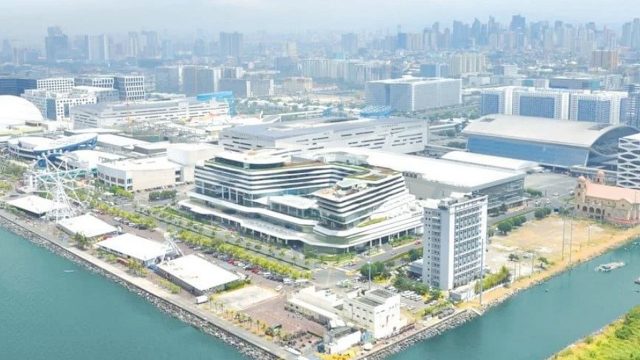Moira Lang’s NO SHOWING booth attracted a slew of filmmakers and film lovers
WHILE the NO SHOWING booth at the roof deck of Art Fair Philippines looked like a chill speakeasy with a dance floor spruced up by old movie posters and bathed in moody red light, it actually played host to many conversations about the state of filmmaking and moviegoing in the Philippines.
“People love hanging out and talking while drinking. It seems like it’s all just for fun, but a lot of things get questioned and challenged and resolved in this set-up,” said filmmaker Moira Lang, who organized and curated the project, at the fair’s vernissage on Feb. 15.
Over the course of the next three days, directors, producers, actors, critics, and film enthusiasts discussed and pondered many things — how to improve filmmaking practices, why films get stuck in the trappings of either box office numbers or festival circuit acclaim, and even the existential question of why any of them still make films.
This was just the type of stuff to talk about over beer, with music by selected filmmakers playing just loud enough not to interfere as guests talked and listened to one another.
One topic that made rounds in the free-flowing discussions was the success of films like Gomburza, Firefly, and Rewind in the most recent Metro Manila Film Festival (MMFF).
“The film industry has changed because of streaming and all that, but I’m hopeful for it. There’s a lot of activity going on through those platforms and also through festivals like Cinemalaya and MMFF. There’s no such thing as indie or mainstream now; it’s all just people telling stories,” director and actor Carlos Siguion-Reyna told BusinessWorld on the third day of the event.
Sharing a similar hopeful sentiment was award-winning screenwriter and National Artist Ricardo “Ricky” Lee, who said a day prior how great it is to see moviegoers coming back to cinemas and being open to a wide range of narratives.
“If I were a young filmmaker seeing the variety of films in theaters and online, I would be inspired to explore the possibilities of storytelling,” he said.
Mr. Lee concluded his talk on his view on the Philippine industry with one word: optimistic. “I don’t think streaming will ever go away because it’s very convenient, but I think people are realizing how great it is to watch on a big screen. There will always be a place for it,” he said.
His fellow National Artist for Film, Kidlat Tahimik (real name: Eric Oteyza De Guia), was also at the fair that day. The two were confronted by many students and young artists who lined up to take pictures and speak with them, both at a film event held on the roof deck and on the exhibiting floors that they passed through below.
Various directors graced the NO SHOWING booth, like Joyce Bernal, Raymond Red, Erik Matti, and Quark Henares (who also DJ-ed one night).
Documentary filmmaker Sari Dalena was there too, saying how each person must find their own way in the industry.
A former director of the University of the Philippines Film Institute, she pointed out the rising alums of the film school who were in attendance — Martika Ramirez Escobar, whose film Leonor Will Never Die garnered acclaim in local and international festivals, and Petersen Vargas, who recently directed A Very Good Girl, one of the biggest Star Cinema films to date.
“There’s always room to grow and find your way, even though it can be a headache in this industry,” Ms. Dalena said.
Ricky Orellana, head of the Mowelfund Film Institute’s audiovisual archives, was admiring the collection of movie posters of classics like Insiang and Maynila sa Mga Kuko ng Liwanag adorning the walls of the speakeasy.
The posters and much of the furniture at the booth were provided by the Archivo 1984 Gallery headed by Juan Martin Magsanoc. Their own booth a few floors below was also filled with books and magazines.
“Archives are being beefed up these days,” Mr. Orellana told BusinessWorld. “At Mowelfund, we bought some equipment to maximize the digitization of materials. We’re also coming up with an online public access catalog that will be launched this March.”
He noted the importance of improving access to film-related research materials, like books, news clippings, and magazines. “It all has to be online now, for more people to see and read,” he said.
On Feb. 18, as the DJ table and the sound system and the dance lights were turned off by maintenance at The Link carpark (two hours after the event had concluded), Moira Lang watched the crowd reluctantly dissipate, still buzzing with energy and pumped from the music and booze.
“It’s a wrap!” she said, before they all had to pack up and leave behind the small, short-lived, weekend-long home of many film discussions.
Among the items to take down were the “Free Jade Castro & friends NOW!” posters that greeted all visitors upon entry. These referred to the case of fellow filmmaker Jade Castro who, on Jan. 31, was arrested without a warrant along with his three friends for allegedly burning a modern jeepney in Catanauan, Quezon, despite CCTV showing they were in another town when this happened.
Still in police custody and facing an arson charge, he awaits an investigation by the House Committee on Public Order and Safety. All Ms. Lang and those at the Art Fair could do for now was talk about the case.
“Real life really is stranger than fiction,” she said. — Brontë H. Lacsamana












